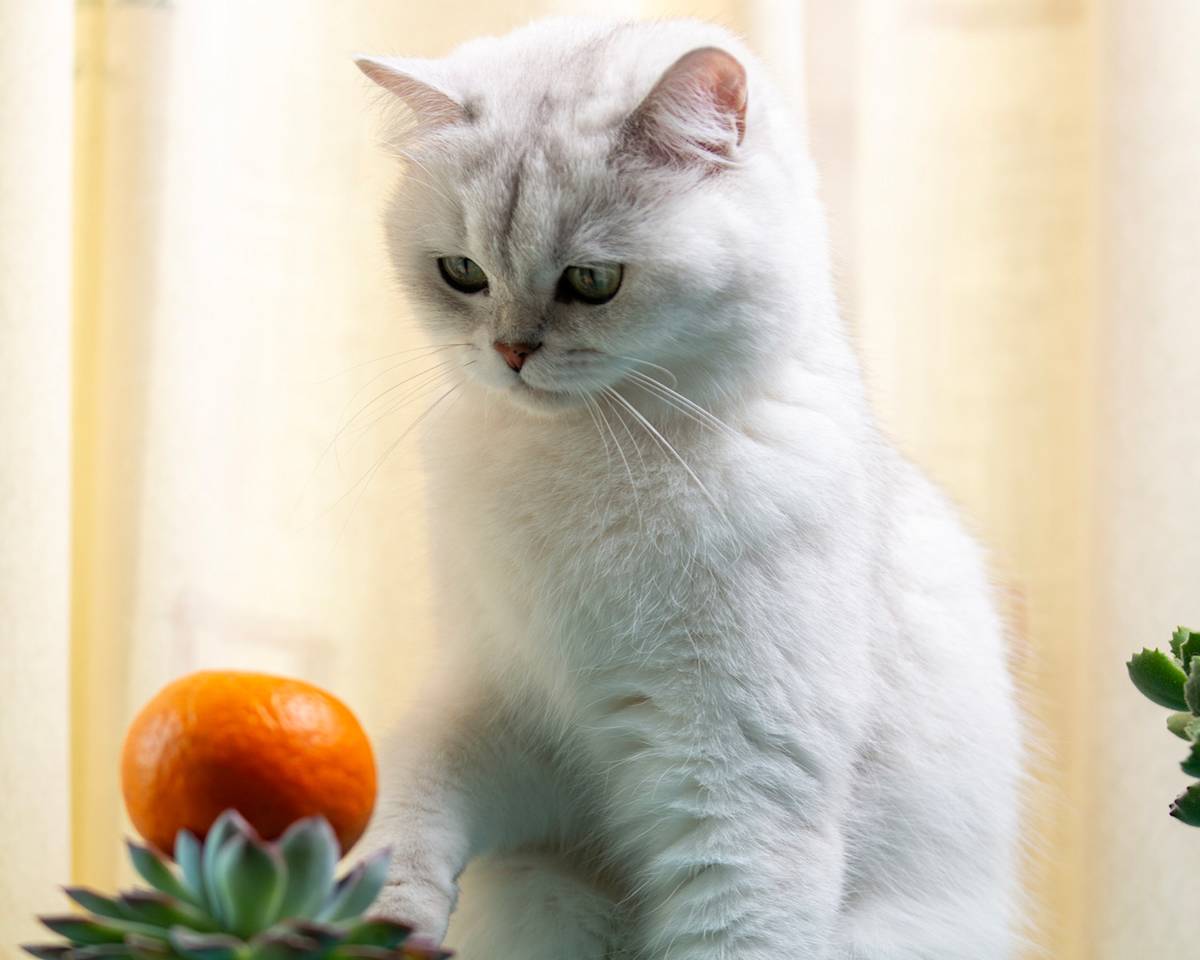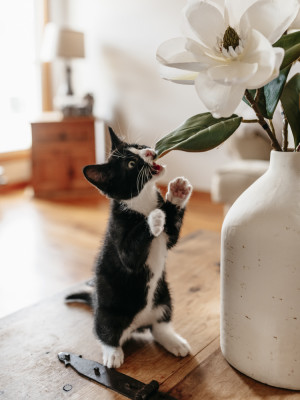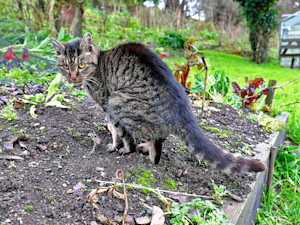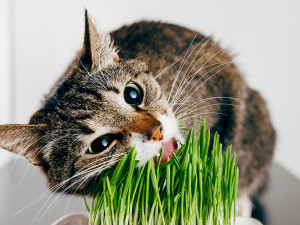The Citrus Solution: Does Orange Peel Really Deter Cats?
What science says about fruit vs felines

Share Article
In this article|:
Do orange peels keep cats away? Why the smell of oranges deters cats Should you use orange peels to keep cats out? Other types of cat deterrent to consider Downsides of using orange peels to deter cats Cats and orange peel FAQs
Have you ever peeled an orange near your faithful feline and noticed their dramatic reaction when a bit of juice accidentally sprays in their direction? Maybe you’ve witnessed the narrowed eyes, the sudden leap away, or even a full-on dash out of the room in response to the fruit? What exactly is it about oranges that causes such a strong reaction? Is it the sudden spray that surprises them, or is it something about the scent of the orange itself?
Cats are famously sensitive to smells in their environment, and citrus seems to be especially offensive to their delicate noses. In fact, this aversion has led many pet parents using orange peels as a simple, natural way to discourage unwanted cat behaviours. Whether it's scratching the furniture, digging in houseplants or exploring the kitchen counters, the idea of using something as harmless and accessible as orange peel is certainly ap-peel-ing.
Before we get to that though, let‘s take minute to discover why cats react the way they do to citrus, then we‘ll explore whether orange peel can actually serve as a reliable deterrent and crucially, how safe this method really is.
Do orange peels keep cats away?
Known for their curious nature and territorial instincts, cats will often roam into gardens, climb furniture and scratch areas that are bound to annoy us. For many pet owners and avid gardeners, finding that humane way to deter the cats away can sometimes be a full-time job. Many of the products that are sold in pet shops as pet friendly deterrents have one common ingredient… citrus, but do they actually work? The truth is, cats have a far more sensitive sense of smell than us humans (up to 14 times more sensitive) and therefore they generally dislike the particularly strong citrus-y aroma.
Many people report that scattering fresh orange peels around areas they want to keep cat-free like garden beds, house plants or furniture can discourage cats from approaching. However, their effectiveness can vary based on:
The cat’s personality: like us, some cats are more sensitive to smells than others so it would certainly be a try it and see approach.
Freshness: the smell of the orange peel will fade quickly so you may need to replace them every few days. However maybe a good ploy to get the family eating more fruit.
Amount used: large amounts maybe needed to create a strong deterrent.
Are orange peels harmful to cats?
While orange peels are generally not deemed as toxic in small quantities they should not be ingested by cats. Citrus oils can cause gastrointestinal upset or even toxicity in large amounts. They could also develop irritation to their mouth and skin if they get contact with the oils. So if you have a particularly curious cat that might choose to chew, eat or even roll around on the peels it may be better to use a pet friendly citrus-based spray.
Why the smell of oranges deters cats
Cats have powerful noses and so even mild scents can be overwhelming and intense for them. Orange and lemon peel contains strong smelling oils like limonene, linalool and citral. These are found in many citrus fruits and are often found as ingredients in natural insect repellents and cleaning products. Avoidance of the scent probably boils down to their protective territorial instincts to keep themselves safe.
Should you use orange peels to keep cats out?
If you want a simple, cheap and eco-friendly way to keep cats out then orange peels are worth trying. But don’t rely solely on them to solve persistent behaviour problems. Always monitor your cat’s reaction, and consider combining orange peels with other humane deterrents and training methods.
Other types of cat deterrent to consider
If orange peel isn’t working, seems messy or you can’t eat enough quick enough then you could consider the following
Commercial cat repellent sprays: containing citrus, essential oils or herb scents, these are designed to be safe for pets and plants and can be applied to furniture, plants or garden areas.
Motion-activated sprinklers: these are perfect for outdoor gardens and will fire a quick blast of water if a cat approaches. Most cats dislike sudden water and will avoid the area
Ultrasonic cat repellents: these emit a high frequency sound only cats (and some other animals) can hear. The sound is unpleasant but harmless and can encourage cats to leave.
Physical barriers: you could use chicken wire, mesh or fencing to keep cats out of specific areas. Covering garden beds with prickly mulch or stones can discourage digging of the soil
Plants that repel cats: consider growing some plants that naturally deter cats like Lavender, rosemary and coleus canina (known as scaredy cat plant!)
Are there downsides of using orange peels to deter cats?
When we are trying to deter cats from unwanted behaviours we have to ensure that we are redirecting their undesired behaviours onto something more appropriate ie, scratching a cat post rather than the table leg. We do not want to be breaking our bonds with them as the trust they feel for us is important in maintaining our relationships with them
Orange peels can offer a natural, inexpensive and non-toxic way to deter cats; however, their effectiveness is often limited and short-lived. Relying on a deterrent alone may not fully resolve the issue. It's important to consider the individual cat’s environment, temperament, and the specific behaviours they’re displaying. Often, we need to go beyond simply discouraging unwanted actions by redirecting those behaviours onto more appropriate alternatives. Cats are complex creatures, and understanding the why behind their actions is key to managing them in a kind and effective way.
Frequently asked questions: cats and orange peels
Do orange peels really keep cats away?
Yes cats will often avoid orange peels due to their sensitive noses and instinctive caution around citrus-based substances.
Do cats hate orange peel smell?
Cats will avoid the smell of oranges because it can be overwhelmingly strong and naturally unpleasant for them.
What does orange peel do to cats?
If ingested it can be mildly toxic to them and cause vomiting, diarrhoea, dribbling or lethargy.
What smells do cats absolutely hate?
Cats often dislike other strong smells like vinegar, eucalyptus, rosemary, lavender, peppermint and cinnamon.

Zoe Blake RVN, ISFMCertFN / AdvCertFB, MISAP
Zoe is a registered veterinary nurse and has been in the profession for over 30 years, with specific interests in Diagnostic Imaging, Feline Behaviour, Animal Handling, Preventative Healthcare Clinics. She enjoys educating pet parents on all aspects of their care and loves writing about all aspects of pet care to educate pet parents to understand and provide the best to their animals by sharing hr valuable knowledge. When she is not chatting animals, she can be found running around the tennis court or exploring the countryside with her rescue dog, Dylan.
Related articles
![]()
How To Create a Cat-Safe Garden
Green fingers at the ready
How to Stop Your Cat From Munching On All of Your Precious Plants
Tips to get your cat to quit eating your greens
![]()
How To Stop Your Cat Pooing in the Garden
Are faeces in your flower beds ruining your garden?
![Cat chewing on cat grass]()
8 Pet-Safe Plants Your Cat Can Veg Out On
Cats love the crunch of a houseplant. These ones will do them no harm




